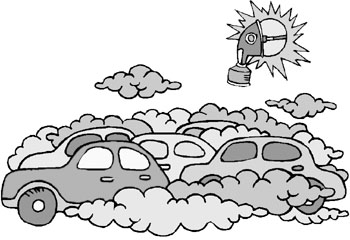![[Metroactive News&Issues]](/gifs/news468.gif)
[ North Bay | Metroactive Home | Archives ]
Drivers, Kill Your Engines!
As the cars idle, the pollution swells
By Mari Kane
If idle hands lead to Satan's mischief, imagine the damage done by idling cars. We've all seen it--a chugging, empty vehicle spewing a vortex of fumes in front of a store while its owner runs inside for a carton of ice cream.
The American Lung Association kicks off Clean Air Month in May with the announcement of air pollution "grades" for California's counties. Sonoma County received a grade of D. Napa County received a B; Marin County got an A. Officials point out that Sonoma's low grade is largely due to pollution traveling north (Alameda, Contra Costa, and Santa Clara counties all received failing grades).
Idling, while by no means the root of the problem, creates air pollution, further exacerbating an existing public health problem; the sound and smell annoy other drivers and pedestrians, thus fostering animosity; and, when viewed in the context of global warming, idling your car is about as responsible as fanning the flames of your burning house.
Canada has already recognized and taken action against auto idling. The city of Toronto, for instance, recently passed a by-law which imposes a fine of up to $5,000 for idling more than three minutes at a time. This shift came after Natural Resources Canada's (NRCan) Office of Energy Efficiency estimated that in the peak of winter, Canadians voluntarily idle their cars for a total of more than 75 million minutes a day.
"Emissions from idling vehicles are completely unnecessary and can be easily prevented with the turn of a key," said NRCan minister Ralph Goodale. "If every driver of a light-duty vehicle in Canada avoided idling for just five minutes per day, we would prevent more than 3,800 tons of carbon dioxide from entering the atmosphere each day. It will make a world of difference."
One of the most popular reasons for car idling is to warm up the car, the benefit of which is now considered nonexistent. According to NRCan, idling is actually a bad way to warm up your car's engine because the incomplete combustion creates fuel residue condensation on cylinder walls while also contaminating engine oil and clogging spark plugs, which further increases fuel waste. Moreover, wheel bearings, steering, suspension, transmission, and tires also need to be warmed up, and the only way to do that is to get the vehicle moving.
As for letting the car run while dashing into a store, NRCan says that idling for more than half a minute burns more gas than it takes to restart the engine.
Santa Rosa Junior College automotive instructor Pat Sullivan agrees that there is no logical or mechanical reason for idling a car or truck, even a diesel one. "No new car needs to warm up," he says. "Big diesel trucks may be hard to start if they have a turbo charger, and they need to cool down before being turned off. But most manufacturers recommend you just get into a car and drive it."
Owners of SUVs often claim, as an excuse for idling, that their vehicles' engines burn cleaner than older models. Sullivan counters that SUVs don't meet the same carbon dioxide emissions standards as regular cars, and so there is no comparison. According to the Coalition for Clean Air, light trucks and SUVs emit approximately three times more pollution than the average new car and are much less fuel efficient.
Then why do people leave their SUVs and trucks running? Sullivan theorizes that it has something to with the big truck ethos of young, male drivers. "I think they just like to hear the sound of their car idling," he opines.
Ultimately, the issue comes down to wasting a resource over which the U.S. government wreaks global havoc to provide. For example, at this time, Washington is pressuring the former Soviet republic of Kazakhstan to support the Baku-Ceyhan oil pipeline, which would traverse the political hot spots of Azerbaijan, Georgia, and possibly war-torn Afghanistan. In this hemisphere, the Bush administration wants to spend $98 million to support the Colombian army's effort to protect a pipeline operated by Occidental Petroleum, a conduit that suffered 170 bomb attacks last year and has, over time, spilled more oil than 10 Exxon Valdezes.
So if the thought of poisoning the air, wasting money, and creating a public nuisance isn't enough to make drivers turn off their ignitions in the gas lines at Costco, perhaps the onus of helping to destabilize our oil-skewed foreign policy will be. With Uncle Sam and Big Oil risking national security in order to provide more fuel for America's gas tanks, killing one's engine is perhaps one of the most patriotic things a citizen can do. It sure beats waving a flag.
[ North Bay | Metroactive Central | Archives ]
Copyright © Metro Publishing Inc. Maintained by Boulevards New Media.
![]()

Cough, Cough: Idling your car provides no benefit to you, your car, or the environment.
From the May 2-8, 2002 issue of the North Bay Bohemian.